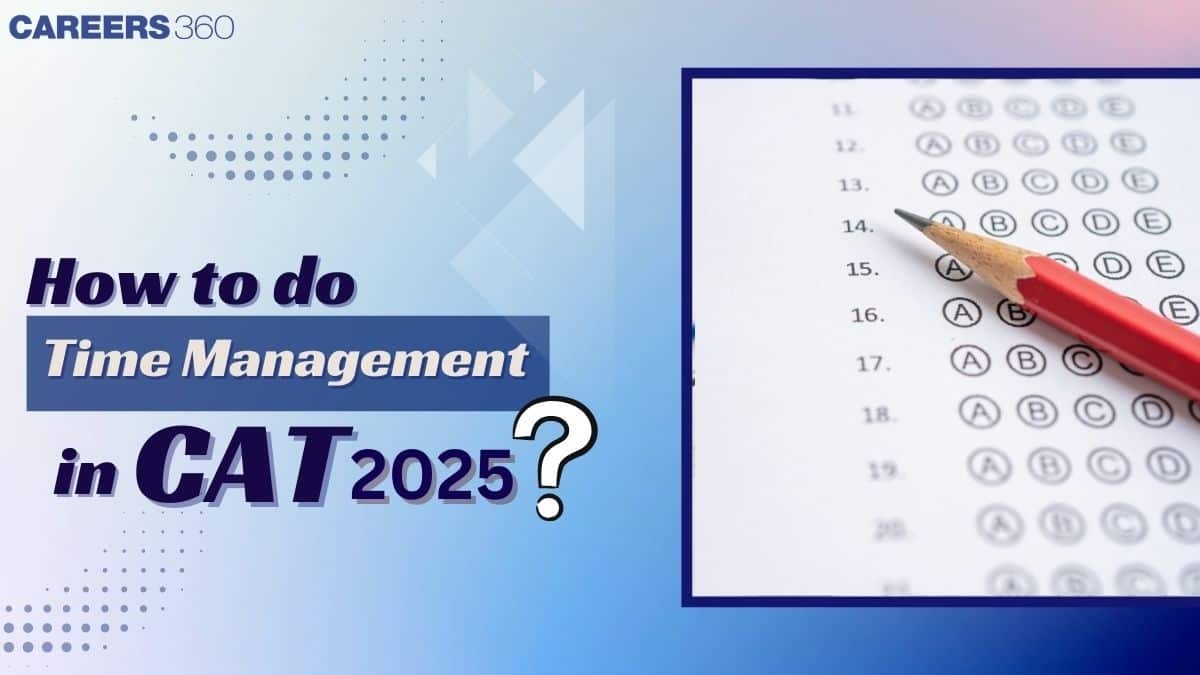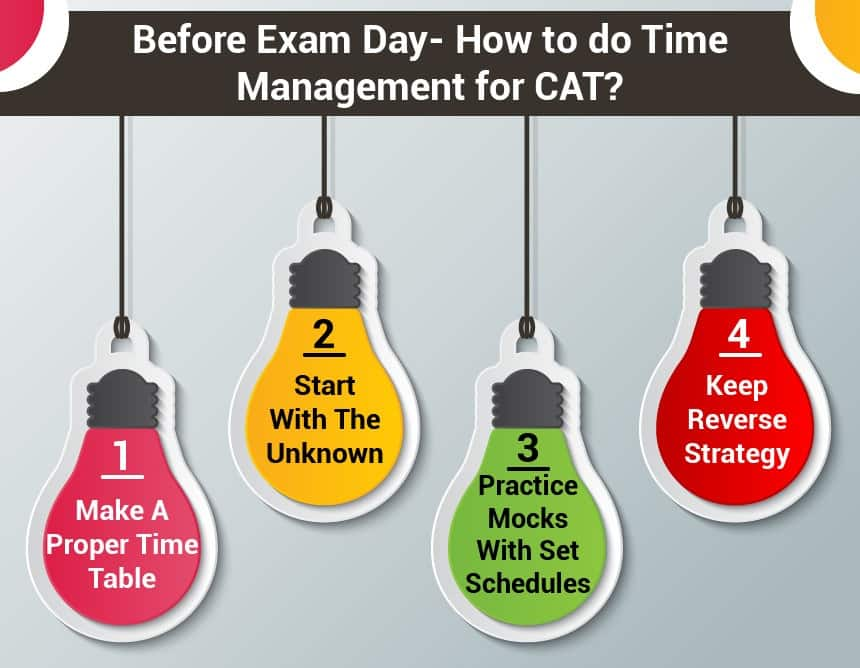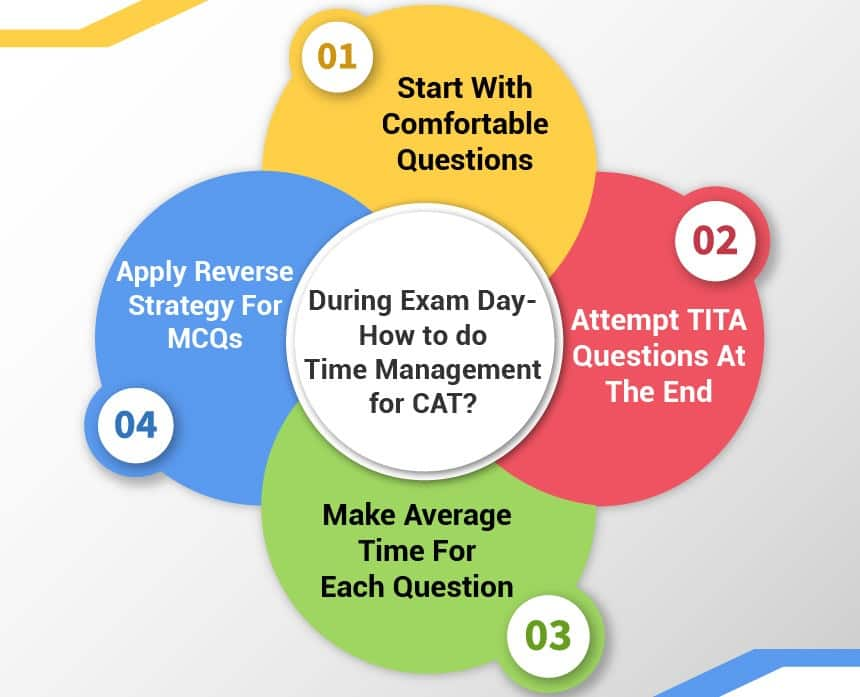Great Lakes - PGDM & PGPM Admissions 2026
Application Deadline: 10th March | Globally Recognized by AACSB (US) & AMBA (UK) | 17.8 LPA Avg. CTC for PGPM 2025
For candidates beginning their CAT 2026 preparation, learning time management early can make a huge difference in performance. The CAT exam is not just about knowing concepts but about solving the right questions within a strict time limit. Many aspirants struggle not because they lack knowledge, but because they fail to manage time effectively during the exam. Developing strong time-management skills from the start helps improve speed, accuracy, and confidence.
This Story also Contains

This article explains practical time-management tips and strategies that will help CAT 2026 aspirants use every minute wisely on exam day.
Time management will be crucial for the CAT 2026 examination. Time management skills can be developed in three simple steps:
Make a target
Divide 40 minutes into each section accordingly to achieve your target
Apply this in your mock tests
Remember, you have just 40 minutes for each section, and you have to complete each section within this time. It should also be remembered that changing between parts is not permitted throughout the examination. To succeed in the CAT test, MBA candidates must develop efficient time management skills both before and after the exam. Although the number of questions in each segment varies, the allocated time stays similar. As a result, applicants must grasp how to complete each component within the allotted time.
When we say how to do time management for the CAT, it not only refers to the overall timings of the CAT exam but also includes the sectional timing as well. One of the theories on time management is the “goal-setting theory,” which is based on the concept that a person can be more motivated to perform any task if they have a clear and specific goal to achieve.
As per the topper of the CAT, Vishesh Garg, “Time management should be considered the fourth section of the CAT examination. It is not just preparing verbal ability, reasoning, and quantity, but preparing all three and attempting them within 3 hours of the stipulated time.”. For him, time management & hard work will lead to success for sure.”
Another CAT topper, Ashish Sen, said, “Time management combined with my knowledge of my strong and weak areas benefited me to get 99+, which I never expected. I managed to schedule the preparation time along with placement preparation. During the exam, I found 2 sections in DILR time taking and chose not to attempt them. Coming to QA, I knew which questions I would solve in 60 minutes and attempted only 20 questions.”
Quick Links:
As per the exam pattern of CAT 2026, candidates will have 40 minutes to solve any particular section. In 40 minutes per section, candidates will have to solve both multiple-choice questions as well as TITA questions. Henceforth, it becomes imperative for candidates to understand and manage their time well.
Time management has the greatest impact on your CAT score. A study shows that if the time taken per question is increased, the score of a candidate drastically decreases.
Expected Percentile | Time taken Per Question |
More than 99 percentile | 1 to 1.5 minutes |
95 to 99 Percentile | 1.5 to 3 minutes |
90 to 95 percentile | 3 to 4.5 minutes |

To crack any exam with a good score, two things are very important: Accuracy and Time management. Here, we are going to discuss a few strategies to develop time management skills during preparation.
Making a timetable will allow candidates to channel their preparation in the right direction
Always remember that planning before execution should be made compulsory
Another time management theory for CAT is the ABC System theory, which states that to use time more effectively, a person needs to prioritize the tasks that need to be undertaken
Shivam Chandak (one of the toppers of CAT) said, “I had not joined any coaching, but I took the test series and also did previous CAT papers. I think self-study is sufficient when one has a clear picture of his/her schedule. That being said, I think good coaching will improve one's chances, provided he/she maintains self-study along with it.”
Application Deadline: 10th March | Globally Recognized by AACSB (US) & AMBA (UK) | 17.8 LPA Avg. CTC for PGPM 2025
Ranked among top 10 B-Schools in India by multiple publications | Top Recruiters-Google, MicKinsey, Amazon, BCG & many more.
Also read: CAT - 2026 Preparation Time Table
Quick Link -
Since you have a good 6 to 9 months of time duration in hand, you can always start with those CAT syllabus topics that are unknown or that you find difficult.
Make sure to find apparent and meticulous ways of solving questions using time management tricks
To start ahead with the unknown, it is advisable to spend one hour daily on each topic and simultaneously make notes on the same.
To gain an understanding of the CAT exam day scenario, giving mocks is extensively recommended. The mock test of CAT will help candidates assess themselves, understand the exam pattern well, and see the preparation level required.
Do not take a mock test of CAT for granted. CAT topper Aditya Devalla said, “He used to regularly take the mock test and devote at least four to five hours. He practiced a lot of questions on Geometry so that he was able to solve it with ease, as solving more questions gave him the confidence to respond correctly on the day of the exam.”
Topper Abhilasha Balakrishnan said, “He attempted mocks regularly, identified his strengths and weaknesses in every mock, capitalized on his strengths and worked on his weaknesses, and repeated this cycle. By the time CAT arrived, he had given around 20–25 mocks, which gave him exposure to a lot of questions and DILR sets. Rest; it was just being present on the day of the exam and applying all of this properly.”
Do not try to work out your brain on what is unimportant. Solve the previous question papers of CAT using the reverse strategy, especially for those questions that seem difficult to leave. Understand the questions and look out for the options. In the reverse strategy, candidates first have to go through the options given and then try to put the question with options to find the most suitable answer.
Quick Link:

Solve Easy Questions First: On exam day, as soon as you start your CAT question paper, it is advisable to start with easy questions. Here, easy questions mean those that candidates are comfortable solving, i.e., easily understandable questions, quickly solved, and require less time. Finding such questions becomes easy only when you know the time management for CAT. For questions that appear to be unknown or time-consuming, mark them for later on. While you are in the exam hall to give the CAT, before starting a section, spend some initial time scanning the questions. On the top right corner, a small button on the screen will allow candidates to look at the entire section in a single view.
Attempt TITA Questions at the End: Every year, IIMs include more than five TITA questions in the question paper. TITA questions are attractive because there is no negative marking. Candidates tend to waste a lot of time on TITA questions on account of no negative marking, as they forget they have MCQs to solve as well. However, candidates forget that TITA questions are time-consuming. Henceforth, it is advisable to do TITA questions at the end when you are done with the MCQs of that particular section.
Make an Average Time for Each Question: Before starting the CAT question paper, it is advisable to set an average time per question. If you are unable to do so, try taking an average time per section, and along with that, leave some additional time to review what you have answered to ensure chances of accuracy.
Apply Reverse Strategy For MCQs - To properly utilize the technique of time management for CAT, try solving the multiple-choice questions with the reverse strategy for those questions that are difficult and understandable.
Quick Link:
To save time and do sectional time management for CAT, it is crucial to remember that you know the art of leaving. Leave those questions unanswered that you think are difficult, time-consuming, or out of your reach.
Now, let us go in-depth on section-wise time management strategies for each section of the CAT examination to effectively attempt the CAT 2026 exam.
For CAT VARC 2026,
Manage your time by quickly skimming through passages to understand their main ideas before diving into questions.
Start with questions you find easier to build confidence and ensure you get marks early.
Set strict time limits for each passage and stick to them to avoid spending too long on any one part.
Practice regularly under timed conditions to improve your reading speed and comprehension.
Use the process of elimination on tricky questions to save time and make better choices.
For CAT DILR 2026,
Manage your time effectively by starting with questions or sets you find easier to boost your confidence.
Quickly scan the entire section to identify which sets you can solve faster and prioritize those.
Allocate a specific amount of time for each set and stick to it to ensure you don't spend too long on any single one.
Practice regularly with timed exercises to improve your ability to analyze data quickly and accurately.
Stay organized and avoid getting stuck on difficult questions—move on and come back if time permits. Keeping a steady pace and staying calm will help you efficiently handle the data interpretation and logical reasoning challenges.
For CAT QA 2026,
Improve your mental math skills and use shortcuts and formulas to speed up problem-solving.
Familiarize yourself with question patterns by practising with previous years' papers.
Track your time during practice to gauge your pace and make adjustments as needed.
If a question is too complex or time-consuming, move on and return to it if time allows.
Keeping a steady pace and focusing on efficient problem-solving will help you navigate the quantitative section effectively.
Candidates are highly encouraged to download and review the resources listed below to improve their CAT 2026 exam preparation. These ebooks have been specifically designed to meet the needs of management exam aspirants and can be extremely beneficial for their studies.
eBook Title | Download Links |
3000+ Most Important Words - Vocabulary Builder | |
500+ Most Important Idioms and Phrases | |
300+ Most Important Phrasal Verbs | |
Permutation & Combination - Video Lectures and Practice Questions | |
Mastering DILR Questions with Expert Solutions |
Frequently Asked Questions (FAQs)
Mock exams provide a genuine exam experience. They assist you in understanding the test structure, assessing your preparation level, and identifying your strengths and shortcomings.
Do not spend more than two or three minutes on any one question. If you can't figure it out fast, on to the next one. Instead of feeling slowed down by difficult questions, concentrate on answering simple ones quickly.
To adequately prepare for the CAT, study for at least 6-7 hours every day for 6-8 months.
Yes, you can. There are several free materials accessible online, such as videos on YouTube. Practice regularly, focus on your weaknesses, and use past CAT papers for studying.
Create a study timetable to keep track of what you need to learn. Prioritize tough subjects and devote an hour every day to them.
On Question asked by student community
Hello
If you are looking to take admission in the MBA programme with a CAT score of 73, check out the list of MBA Colleges accepting 70-80 percentile .
All the best!
You can find all the information here:
CAT- https://bschool.careers360.com/articles/cat-exam-dates
SNAP- https://bschool.careers360.com/articles/snap-exam-dates
Hi Minakshi,
You can find the details related to IIM Kashipur admission criteria by clicking on the link below:
Dear Saloni,
May i know which college you are looking to apply for? Because the MBA fee varies from one college to another. Please check MBA fees colleges wise here:
MBA Fees in India 2025: Top Colleges, Fee Structure, Courses, Cost of MBA
Check your devices and email; you may still have the soft copy of the Admit card. If not, don't panic, the CAT 2025 admit card may not be a huge requirement after the exam; the CAT scorecard is usually asked for the admission formalities.
Ranked among top 10 B-Schools in India by multiple publications | Top Recruiters-Google, MicKinsey, Amazon, BCG & many more.
Application Deadline: 10th March | Globally Recognized by AACSB (US) & AMBA (UK) | 17.8 LPA Avg. CTC for PGPM 2025
Industry Internship Training
NAAC A++ Accredited | Ranked #12 by NIRF
Last Date to Apply: 28th Feb | Ranked #36 amongst institutions in Management by NIRF | 100% Placement
MBA Admissions Deadline 28th Feb'26 | UGC Approved Programs | Near 100% Placement Record | Up to 100% Scholarships | Highest CTC 21.32 LPA